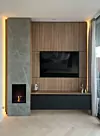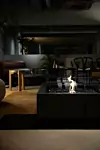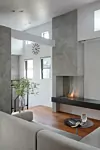Cheminées sans conduit vs. avec conduit : quelle est la meilleure option pour vous ?
Loading image...


Comprendre vos options de cheminée
Le cœur des maisons modernes
Les cheminées ont toujours été considérées comme le cœur de la maison, un lieu de rassemblement où familles et amis partagent des histoires, savourent des instants de quiétude ou se laissent envelopper par l’éclat réconfortant d’une flamme vacillante. Les cheminées contemporaines d’aujourd’hui offrent bien plus que la chaleur ; elles signent des déclarations de design sophistiquées qui subliment l’esthétique de votre intérieur et instaurent une atmosphère de luxe et de confort.
Sans conduit vs. avec conduit : différences essentielles
La distinction principale entre cheminées sans conduit et avec conduit tient à la gestion de la combustion :
Les cheminées avec conduit fonctionnent comme les cheminées traditionnelles, nécessitant un conduit ou une cheminée pour évacuer vers l’extérieur les sous‑produits de combustion. Bien que cette approche soit la norme depuis de nombreuses années, elle présente des limites en matière d’efficacité et de flexibilité d’installation.
Les cheminées sans conduit (également dites sans ventilation ou sans évacuation) incarnent l’évolution de la technologie des cheminées, conçues pour brûler avec une telle efficacité qu’elles n’exigent aucune évacuation externe. Ces systèmes ventilés par la pièce utilisent l’air intérieur pour la combustion et visent à produire des sous‑produits minimaux.
Il est important de noter que toutes les cheminées sans conduit ne se valent pas. La source de combustible influe fortement sur les performances et la qualité de l’air intérieur.
Loading image...


Qu’est‑ce qu’une cheminée sans conduit ?
Comment fonctionnent les systèmes ventilés par la pièce
Les cheminées sans conduit reposent sur un principe simple mais sophistiqué :
- Elles puisent l’oxygène de la pièce pour soutenir la combustion
- Le bioéthanol brûle avec une efficacité remarquable
- La chaleur rayonne directement dans la pièce sans s’échapper par une cheminée
Les cheminées modernes au bioéthanol sont conçues pour brûler proprement et efficacement, en produisant des sous‑produits minimaux. Le processus de combustion du bioéthanol crée une flamme belle et dansante tout en générant une chaleur rayonnante, sans les émissions préoccupantes associées à d’autres types de combustible.
Pourquoi les propriétaires plébiscitent les cheminées sans conduit
Efficacité de combustion exceptionnelle
Avec des taux d’efficacité de combustion allant jusqu’à 99 %, les cheminées au bioéthanol sans conduit convertissent presque tout leur combustible en chaleur utile. Contrairement aux modèles avec conduit qui perdent une part importante de chaleur par la cheminée, les cheminées sans conduit délivrent pratiquement toute leur chaleur directement à votre espace de vie.
Cette efficacité en fait d’excellentes sources de chaleur d’appoint, pouvant potentiellement réduire vos coûts de chauffage durant les mois froids.
Options d’installation flexibles
Sans exigence de cheminée, de conduit ni de ventilation externe, les cheminées encastrées sans conduit offrent une flexibilité d’installation sans précédent :
- Les options autoportantes peuvent être installées quasiment partout
- Les options de cheminée encastrée peuvent être installées sur presque n’importe quel mur intérieur
- Elles conviennent aux appartements, aux copropriétés et aux maisons où la ventilation est impossible
- Elles nécessitent des modifications structurelles minimales de votre habitation
- L’installation prend généralement des heures plutôt que des jours
Cette flexibilité rend les cheminées sans conduit particulièrement attrayantes pour les rénovations ou lorsqu’il s’agit d’ajouter une cheminée à un espace existant où l’installation d’une cheminée serait prohibitivement coûteuse ou structurellement impossible.
Options de bioéthanol écoresponsables
Pour les propriétaires soucieux de l’environnement, les cheminées sans conduit alimentées au bioéthanol constituent une option particulièrement attrayante. Les cheminées au bioéthanol EcoSmart Fire brûlent un combustible renouvelable obtenu par la fermentation de sous‑produits végétaux tels que la canne à sucre.
- Ces systèmes à combustion propre produisent :
- Aucune fumée ni suie
- Aucune cendre à nettoyer
- Un dioxyde de carbone minimal (similaire à la quantité produite par des bougies)
- Aucune émission nocive nécessitant une ventilation
- Prise en compte de la qualité de l’air intérieur
Lors du choix de cheminées sans conduit, la qualité de l’air intérieur doit être une préoccupation majeure. C’est là que la distinction entre les différents types de systèmes sans conduit devient cruciale.
Loading image...


L’atout bioéthanol
Les cheminées sans conduit au bioéthanol, telles que celles d’EcoSmart Fire, sont conçues en mettant la qualité de l’air intérieur au premier plan – mais l’avantage supplémentaire réside dans le combustible recommandé lui‑même. Sans un bioéthanol premium comme e‑NRG, même la cheminée la plus avancée ne peut tenir pleinement sa promesse de chaleur propre et vibrante.
e‑NRG est le seul combustible bioéthanol recommandé pour les cheminées EcoSmart Fire et il est spécifiquement formulé pour produire la flamme orange la plus vibrante, la plus longue durée de combustion et la plus faible odeur du marché. Ce mélange propriétaire garantit que chaque combustion est non seulement visuellement saisissante, mais aussi exceptionnellement propre, n’émettant que de la chaleur, de la vapeur et une petite quantité de dioxyde de carbone – à peu près l’équivalent du souffle humain. Aucun fumée, aucun suie et aucune cendre signifie que vous n’aurez jamais à gérer de résidus sur vos murs, vos meubles ou dans l’air.
La pureté et l’efficacité du e‑NRG se traduisent par une expérience intérieure plus sûre et plus agréable. Pas d’odeurs persistantes, pas de nettoyage fastidieux et pas de polluants cachés – simplement le plaisir d’une vraie flamme, alimentée par une source d’énergie renouvelable et d’origine végétale. Avec e‑NRG, vous libérez tout le potentiel de votre cheminée à éthanol EcoSmart Fire, en veillant à ce que chaque moment au coin du feu soit aussi propre et sans effort que beau.
L’attrait des cheminées avec conduit
Bien que les cheminées avec conduit aient été historiquement associées à un style traditionnel, les options modernes sans conduit, telles que les designs contemporains d’EcoSmart Fire, offrent désormais une esthétique épurée sans les inconvénients des systèmes conventionnels avec conduit.
La Flex Series innovante d’EcoSmart Fire allie design de pointe à l’efficacité et à la praticité de la technologie au bioéthanol. Ces inserts de cheminée polyvalents présentent des lignes épurées et un style minimaliste qui s’harmonisent avec les intérieurs modernes, tout en éliminant les inefficacités et les contraintes d’installation des systèmes conventionnels avec conduit.
Considérations importantes pour les systèmes avec conduit
Efficacité de combustion inférieure
La caractéristique déterminante des cheminées avec conduit — leur cheminée ou conduit — est également responsable de leur principal inconvénient : une efficacité de chauffage réduite. Avec une efficacité de combustion généralement comprise entre 70 et 85 %, les cheminées avec conduit perdent une part significative de la chaleur via le système de ventilation.
Cette perte de chaleur implique :
- Une consommation de combustible plus élevée pour le même effet de chauffage
- Des coûts d’exploitation plus importants sur la durée
- Une moindre efficacité du chauffage par zones
- Un impact environnemental accru par unité de chaleur délivrée
- Exigences d’installation et de maintenance
L’installation d’une cheminée avec conduit implique des modifications structurelles importantes :
- Nécessite une cheminée ou un conduit passant par le toit ou un mur extérieur
- Exige une étanchéité et une isolation autour du conduit
- Demande souvent une installation professionnelle par des entrepreneurs spécialisés
- Peut requérir des permis et des inspections pour garantir la conformité aux codes
De plus, les systèmes avec conduit nécessitent une maintenance régulière pour assurer un fonctionnement sûr :
- Nettoyage annuel de la cheminée ou du conduit pour éliminer les dépôts de créosote
- Inspection des joints, des étanchéités et des raccordements
- Vérification du bon fonctionnement du tirage
- Nettoyage des cendres et des débris (pour les modèles à bois)
Ces exigences d’installation et de maintenance augmentent à la fois les coûts initiaux et récurrents liés à la possession d’une cheminée avec conduit.
Loading image...
Choisir la cheminée idéale pour votre maison
Quand les cheminées sans conduit s’imposent
Les cheminées sans conduit sont un excellent choix dans plusieurs scénarios précis :
Pour une chaleur d’appoint dans les espaces de vie
Si vous souhaitez apporter une chaleur ciblée aux zones fréquemment utilisées de votre maison, les cheminées sans conduit excellent par leur efficacité en chauffage d’appoint. Leur efficacité de combustion quasi parfaite les rend idéales pour :
- Séjours où la famille se retrouve le soir
- Bureaux à domicile nécessitant une chaleur supplémentaire aux heures de travail
- Salles à manger bénéficiant d’une chaleur ambiante pendant les repas
Pour une installation flexible et simple
Les cheminées sans conduit conviennent particulièrement :
- Aux appartements et copropriétés où les modifications structurelles sont limitées
- Aux rénovations où l’ajout d’une cheminée serait prohibitif
- Aux maisons modernes à plan ouvert qui profitent de modèles traversants ou en péninsule
- Aux espaces nécessitant une installation rapide et peu perturbante
Pour des solutions propres et écoresponsables
Si l’impact environnemental et la propreté intérieure sont prioritaires, les cheminées sans conduit au bioéthanol offrent des avantages significatifs :
- Combustible renouvelable à plus faible empreinte carbone
- Aucune particule émise dans votre maison ni dans l’atmosphère
- Aucune cendre, suie ou résidu à nettoyer
- Combustion plus propre que même les cheminées à bois les plus efficaces
Les modèles au bioéthanol d’EcoSmart Fire illustrent cette technologie de combustion propre, offrant l’ambiance d’une vraie flamme sans les inconvénients environnementaux des cheminées traditionnelles ni les préoccupations de qualité d’air intérieur des options sans conduit au gaz.
Quand les cheminées avec conduit restent utilisées
Malgré les avantages clairs des options sans conduit, les cheminées avec conduit subsistent dans certaines situations :
- Dans les grands espaces sujets aux courants d’air avec cheminées existantes
Dans les maisons de grande taille aux besoins de chauffage élevés, notamment les propriétés anciennes moins bien isolées et dotées d’une infrastructure de cheminée :
Elles peuvent fonctionner en continu plus longtemps
- Elles gèrent des volumes plus importants d’air de combustion et de sous‑produits
Cependant, même dans ces cas, la conversion vers un système sans conduit à l’aide des inserts Grate Series d’EcoSmart Fire peut transformer une cheminée avec conduit inefficace en solution de chauffage propre et performante.
Dans les habitations soumises à des contraintes réglementaires spécifiques
Certains bâtiments classés ou zones aux codes stricts peuvent imposer des exigences limitant les modifications. Les modèles autoportants d’EcoSmart Fire offrent alors une solution idéale, ne nécessitant aucune installation permanente tout en procurant la chaleur et l’ambiance d’une vraie flamme.
Loading image...


Pourquoi les cheminées sans conduit d’EcoSmart Fire changent la donne
Technologie Clean‑Burning évolutive
EcoSmart Fire a ouvert la voie des cheminées sans conduit grâce à sa collection innovante au bioéthanol. Ces designs de pointe offrent plusieurs avantages distincts :
Zero‑Emission Clean Burning
Les cheminées au bioéthanol d’EcoSmart Fire produisent une flamme belle et vibrante, sans :
- Fumée ni odeur
- Suie ni cendre
- Émissions nocives nécessitant une extraction
- Nécessité de conduit ou de cheminée
Cette technologie de combustion propre permet de profiter de l’ambiance et de la chaleur d’une vraie flamme sans compromettre la qualité de l’air intérieur ni imposer de nettoyage contraignant. Contrairement aux cheminées au gaz sans conduit traditionnelles, qui peuvent laisser au fil du temps des résidus sur les murs et les meubles, les cheminées au bioéthanol brûlent si proprement qu’il n’y a ni dépôt ni décoloration.
Sécurité certifiée à l’échelle mondiale
L’engagement d’EcoSmart Fire en matière de sécurité se manifeste par un processus de certification complet. Leurs produits sont :
- Référencés UL aux États‑Unis
- Certifiés EN16647 BSI pour l’Europe et le Royaume‑Uni
- Conformes au mandat de sécurité ACCC pour l’Australie
Ces certifications rigoureuses garantissent que les cheminées sans conduit EcoSmart Fire répondent aux normes de sécurité les plus élevées sur les marchés mondiaux, offrant une tranquillité d’esprit aux propriétaires les plus exigeants.
Loading image...


Loading image...

 © @a_designersalife @arcprojectsgroup
© @a_designersalife @arcprojectsgroup Loading image...


Polyvalence de design pour chaque maison
EcoSmart Fire propose une gamme inégalée de cheminées sans conduit conçues pour s’accorder à tout style intérieur.
Flexibilité freestanding
La collection freestanding inclut des options de cheminée portables pouvant être déplacées vers différents emplacements selon les besoins :
- La Pod Series offre des unités contemporaines autonomes qui signent une déclaration de design audacieuse
- Les Fire Tables associent la fonctionnalité d’une table à l’ambiance d’une cheminée pour les réceptions en extérieur
- Les Designer Fires proposent des pièces sculpturales servant à la fois de chauffage fonctionnel et de point focal artistique
Intégration Built‑In fluide
Pour des installations permanentes, les modèles Built‑In d’EcoSmart Fire offrent une intégration raffinée à l’architecture de votre intérieur :
- La Flex Series apporte une liberté de design sans précédent avec une installation Zero‑Clearance
- Les Fire Pit Kits permettent des aménagements extérieurs sur mesure avec une complexité d’installation minimale
- Les Grate Series inserts transforment les cheminées existantes en foyers efficaces à combustion propre
Votre décision de cheminée facilitée
Liste de décision
Pour choisir entre cheminées sans conduit et avec conduit, prenez en compte ces facteurs clés :
Taille de la pièce et ventilation
- Mesurez les dimensions de votre pièce et comparez-les aux recommandations du fabricant
- Évaluez la ventilation naturelle et le taux de renouvellement d’air de votre logement
- Considérez l’interaction de la cheminée avec votre système CVC existant
Besoins de chauffage et qualité de l’air intérieur
- Déterminez si vous avez besoin d’un appoint de chaleur ou d’une source principale
- Prenez en compte vos objectifs d’efficacité énergétique et vos coûts de services publics
- Évaluez votre sensibilité aux sous‑produits de combustion potentiels
- Réfléchissez aux effets à long terme sur les surfaces intérieures de votre maison
Contraintes de design et d’installation
- Précisez vos objectifs de style—contemporain, traditionnel ou transitionnel
- Considérez l’intégration de la cheminée à votre décor existant
- Évaluez la capacité de votre logement à accueillir un conduit ou une cheminée
- Prenez en compte votre budget pour l’installation et l’exploitation continue
Considérations environnementales
- Considérez l’impact environnemental des différentes options de combustible
- Réfléchissez à vos préférences de nettoyage et de maintenance
Explorer les solutions innovantes d’EcoSmart Fire
Pour les propriétaires recherchant l’équilibre idéal entre efficacité, liberté de design et responsabilité environnementale, EcoSmart Fire propose une gamme complète de cheminées sans conduit.
Leur Flex Series illustre les possibilités de la technologie moderne sans conduit :
- Disponible en 12 tailles avec des zones de vision de 455 mm à 4.015 mm (18 à 158 pouces)
- Huit configurations, dont simple face, angle, baie et péninsule
- Construction Zero‑Clearance pouvant être directement cadrée en bois
- Aucune ligne de gaz, électricité ni évacuation requise
- Jusqu’à 80 % d’économies par rapport aux cheminées sur mesure avec évacuation traditionnelle
Points essentiels
Les cheminées au bioéthanol sans conduit offrent une efficacité supérieure, une flexibilité d’installation et des avantages environnementaux par rapport aux cheminées traditionnelles avec conduit et aux alternatives sans conduit au gaz.
La technologie bioéthanol innovante d’EcoSmart Fire offre la beauté et la chaleur d’une vraie flamme sans les inconvénients des cheminées conventionnelles ni les préoccupations liées à la qualité de l’air intérieur des autres options sans conduit.
Pour choisir une cheminée, tenez compte de la taille de la pièce, des besoins de chauffage, des préférences de design et de l’impact environnemental afin de prendre la meilleure décision pour votre intérieur.
































































-outdoor-elegance-5531-screen.png)
-outdoor-elegance-5531-screen.webp)

















































